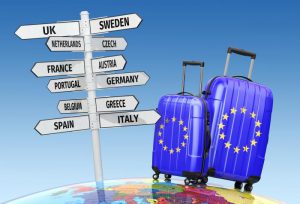Dr. Andraž Teršek, Professor of Constitutional Law
- Introduction
The central purpose of this essay is to, once again, raise the general importance of mental health and suicide. Or, by other words, to once again address the importance of the awareness of general public in EU member States regarding mental health and the problem of suicide. And to at least partially cut off the edges of the stigmatization that is more than obviously still stuck to any attempt at serious and all-inclusive public debate on these issues. At least in my experience.
These two questions, or rather “problems” of the today’s society must be understood as the core of public health systems. On national, international and global scale. Especially, this should be particularly emphasized, after the Coronavirus pandemic in the first part of the year. But also because, or especially because the worldwide medical community express most serious concerns and alerts the public it was only the “first wave” of the pandemic which we have just witnessed.
One of the most obvious and most harmful consequences of the pandemic was and still is fear, public fear. In combination with loneliness and anxiety, it is fear that further contributes to people’s depression and depressive disorders. Which still too often lead to suicide attempts or even and most tragic – to suicides. Therefore, it was expected when psychiatrists and psychotherapists addressed the public with the information that the mental health problem increased and intensified during the pandemic. Especially in those EU member States where strict quarantine was commanded by the government decrees. Slovenia being one of those States.
As a constitutional scholar I have been trying to modestly contribute to such awareness in my homeland, Slovenia, one of the smallest EU member States. I am not satisfied with the effect of my effort. Especially since these two topics are almost neglected in the domestic legal community. This essay represents my determination to continue in trying to positively contribute to the motivation of fellow lawyers to work in greater numbers, more extensively and with lasting determination to increase the quality of the public health system, while at the same time improving the quality and effectiveness of joint mental health care and suicide prevention (not only in Slovenia but) in EU member States. It is not only a question regarding fundamental human rights to health, healthy environment and human dignity. It IS a question about life and death, living and dying.
But there is also another, personal reason for this essay…
2. In Memory of prof. dr. Andrej Marušič
Prof. dr. Andrej Marušič (1965-2008) was my friend. He was a psychiatrist and psychologist, whose work represents an important contribution to the progress in the field of public mental health in Slovenia and worldwide. He has studied Medicine and Psychology in Ljubljana, pursued his postgraduate education mainly in England, where he acquired Doctoral Degree in Psychiatry. As an assistant professor he lectured at the Maudsley Hospital in London and he was the National Coordinator for Mental Health at the World Health Organization (WHO). His particular investigative interest was Suicidiology. He took over a leading function in one of the sections of the International Association for Suicide Prevention (IASP). In 2002 he became the director of the Institute of Public Health of the Republic of Slovenia. He was especially devoted to investigative and clinical work aimed at improving the mental health of an individual and society as a whole. He became the Head of the Health Research Department at the University of Primorska, where he successfully coordinated and completed several national and European research projects focusing on various psychiatric and public health topics. He founded and led his own Health Trust named ‘Healing‘. His rich bibliography includes numerous internationally indexed primary articles from the field of Psychiatry and related disciplines. He was honoured with two international prizes for his research achievements. He was one of the most influential activists for the destigmatization of mental disorders in Slovenia.
Andrej’s intelligence, particularly the emotional one, his love and determination for humanity and his intuition enabled him to understand legal concepts and the logic of legal reasoning better than most of the lawyers or even legal experts I have ever met. Personally and professionally it was a privilege to be a part of his intellectual and scientific attention.
Professor Marušič invited me to join his team and to use the constitutional law, legal philosophy and legal theory as a tool for policy making and policy developing regarding public health, mental health and the problem of suicide. We were planning a research and postdoctoral study programme Law and Suicidiology. Soon after he got cancer and after several months of struggle and pain the unforgiving illness overcame his strength and his will to live.
This essay is a small contribution to Andrej’s professional legacy and a small reflection of my commitment to staying focused on the topic discussed here.
3. The Seriousness of Mental Health problem in Europe
Mental health is considered to be one of the biggest and most serious health problems in Europe, especially (according to the statistical data) for the last decade.[1] (Note: it is a serious problem in Slovenia also, putting my homeland near the top and in some recent years even on the top of the list of EU member States with the highest rate of suicides per capita). Slovenian and European public still awaits the information how many cases of suicide and suicide attempts were there during the Coronavirus pandemic. But it is already clear: the problem of mental health increased and the assumption it will increase even more seems to be a matter of logic.
During the pandemic living conditions were hard to bear and damaging for people with depression, depressive disorders or other mental health problems. Especially since constitutional rights to freedom of movement and socializing were limited (In Slovenia by government decree, prohibiting movement across the municipal borders without special and officially confirmed reasons.) Socializing was limited, in most of the EU member States quite strictly. (In Slovenia even sitting on benches in parks, streets and even in the natural parks and even on the edge of the woods was prohibited.) Even though “the state of emergency” was not officially declared in all of the EU member States (the Slovenian Constitution explicitly determines, by Art. 92, the conditions for such declaration and those conditions were not fulfilled), the exceptional circumstances of public life had an effect as if it has been declared. (Slovenian citizens were living in de facto quarantine.)[2]
4. The problem of Fear
It soon became obvious people all over the Europe are quite frightened. And they seem to be even more frightened as days went by.[3] For most of the time politicians were the ones addressing the public. They took up most of the space and time in the media. According to the daily TV media programs in some EU member States a little more, in others a little less. Doctors, other medical staff or medical scientists were, such was the impression, in the second or third plan. Not only the politicians, even the WHO was using words, such as “combating the Coronavirus.”[4] As if it was the time of war.
In most of the EU member States and most of the time (once again, such was the impression due to the daily TV media programmes and government PR-conferences) the public was addressed with pure statistical data: how many people have been tested for CIVID-19, how many of those were positive and how many people daily died –presumably just from virus. Broader context was rarely offered to the public: information about the age of those who were infected, their other diseases, possible terminal illness… By doing so people, especially the elderly, were even more frightened.
This fear won’t go away with the officially proclaimed end of the Coronavirus pandemic. (Such proclamation came first in Slovenia, Austria and Hungary came second. It has been suggested other EU member States will do it in the second part of June, combined with the opening of the national borders inside the EU.) And this fear won’t go away easily. It is a legitimate concern it will become a new epidemic. In EU member States who already declared the end of pandemic some citizens are still wearing masks when waking down the streets, driving cars, even exercising in nature (same goes for Slovenia). Even though the pandemic officially ended, even though the WHO did not advise that masks should be worn from the start of the pandemic, and even though medical experts and other professionals strongly oppose wearing masks (but the latter did not respond until after the official end of the pandemic). There are no reasonable indicators it won’t be the same or even worse in other member States where pandemic will officially end much later. People are scared and will remain to be scared.
5. The Right to be Protected from Fear
Every single individual, every member of the society, every human has the right to be protected from fear – by the State. I claim it is a fundamental human right.[5] Also in its connection to the right for the protection of health, clear environment, natural heritage and human dignity. To be protected from fear, to be protected from mental health damages and to be protected from social reasons for committing suicide are issues which come hand in hand with the positive obligations of the State regarding fundamental human rights, listed in the ECHR, and fundamental constitutional rights and liberties, listed in national Constitutions (also determined by the Slovenian Constitution). This right should be again and again explicitly recognized, addressed and emphasized as a fundamental human right inside the scope of the EU legal order. Not in spite of, but precisely because of the experience of the 2020 Coronavirus pandemic.
6. The Short-Term Priorities of the EU
Slovenia, as an example of the EU member State, has a National Resolution for facing the mental health problems.[6] But in recent years the forecasts and commitments written in that document basically remained a status of “pure words written on paper,” with no effective and determined, not to say responsible execution in social practice. Even a special Act on Mental Health was enacted, in late 2008, publicly introduced as an appropriate legal framework covering the problems of mental health of individuals and of the Nation. Bit this statute is nothing special. Most of the provisions concern general principles already known and written elsewhere, with addition of the provisions transcribed from the Constitutional Court judgement (No. U-I-60/03) determining fundamental right of individuals who are posted, by doctors or by court decisions, to Psychiatric Hospital for treatment. The documents review of the European Commission regarding mental health of the of citizens of the EU member States shows quite similar picture.[7]
In the EU member states the systemic arrangement of the mental health problem remains insufficiently effective. The deficit of professional staff, funds and special capacities remains obvious. Inside the frame of public health system and institutions, which I strongly consider to be a legal and political priority in the near future, this problem must not be ignored or put aside as secondary or even less important.
7. Legal Foundations for Further Deliberations
In the next months and years special concern should be given to the analysis, interpretation and synthesis of some of the essentially legal and constitutional (not only medical, ethical, philosophical and sociological) questions and problems, directly connected with mental health and the problem of suicide. Mental health and suicide should be fully and publicly addressed as legally relevant phenomena. A constitutional principle of “social state” must be politically and legally strengthened, not weakened. Socially responsible political community (as the EU was supposed to be) may not disregard the issue. Substance and scope of fundamental rights and freedoms closely connected with mental health and the suicide represent special, the most intimate relationship between the State and individual, so the positive nature of fundamental human and constitutional rights must be safeguarded with more effort of the State and its institutions, not with less effort. In this regard the EU Administration must play its part: as a legislator and as a supervisor over the implementation of political commitments and legal duties of the EU member States regarding the public health system, the protection of mental health and the prevention of suicides.
8. Work to be done
Legal aspects of mental health and the suicide problem represent a subject with quite a deficit in respect of scientific research and evaluation. The analysis of the EU institutions and committees regarding mental health confirm such evaluation. This presents us with necessity to make determined and sufficient steps forward. The model of modern constitutional democracy and the constitutional doctrine of positive obligations of the State enable and demand new approach to legal aspects of mental health and suicide. Some new and legitimate expectations towards legal policy and constitutional obligations of the State have to be made. A comprehensive legal and constitutional analysis should fulfil the gap in national and international prospect. All the relevant potentials of legal theory and legal practice should be determined and used for the purpose of reducing the number of cases of suicide and mental illness present in current social life. Success of this research could enable EU as the “political and legal community” to be progressive in evolving public programmes of mental care, psychotherapy, nursing, preventing suicides and palliative care.
The legal community in the EU member States should be deeply involved in forcing the States to do much more in this context as it has been done in previous years. The EU should use common legal order and policy making process to put the EU member States and the daily politics of the member States under an effective control of responding to their legal duties and exercising their ethical, legal and political responsibility regarding mental health and suicide. I consider this to be among the absolute legal and political priorities of the EU legal policies in the next two to five years. Lost time in this regard needs to be made up quickly, with increased awareness, responsibility and efficiency. So I call upon the EU member States legal community for its special and increased attention and effort to face this problem.
The author

Dr. Andraž Teršek,
Professor of Constitutional Law,
Faculty of Education, University of Primorska and European Faculty of Law, New University
References
[1] See, for example: The European Mental Health Action Plan 2013-2020. WHO. Regional office for Europe. Copenhagen, Denmark, 2015: Available at: https://www.euro.who.int/__data/assets/pdf_file/0020/280604/WHO-Europe-Mental-Health-Acion-Plan-2013-2020.pdf (10. 6. 2020); The State of Mental Health in the European Union. Health & Consumer Protection. Directorate – General. European Commission. 2004-2012. Available at: https://ec.europa.eu/health/ph_projects/2001/monitoring/fp_monitoring_2001_frep_06_en.pdf (15. 4. 2020)
[2] Living conditions were the most strict in Belgium, France, Germany, Hungary, Italy, Poland and Spain. See: States of emergency in response to the coronavirus crisis: Situation in certain Member States. Available at: https://www.europarl.europa.eu/thinktank/en/document.html?reference=EPRS_BRI(2020)649408 (1. 6. 2020)
[3] In Slovenia another problem became obvious: hostile disposition towards each other was on the rise. Too many people behaved as they were the police, the surveillance agents towards each other, taking photographs and video recordings of their neighbours and strangers, presumably breaking the government decree not to stand too close to each other when having a conversation, not to socialize in groups of more than five people, not to cross the municipal borders on foot, on bikes and with cars, not to sit down on benches in parks, not to throw balls in basketball playgrounds etc. Too many of them were sending such material to the police. Slovenia almost became a Police State: not because of the police (who did a good job during the pandemic), but because of the “puritanical” character of too many individuals.
[4] See: WHO Campaigns/Connecting the world to combat coronavirus.
Available at: https://www.who.int/campaigns/connecting-the-world-to-combat-coronavirus
[5] Let me just remind ourselves of the Universal Declaration of Human Rights, the Atlantic Charter and the Philadelphia Declaration, which marked the end of the II. world war and announced a new world social order. And in particular of the European Social Charter. All these international legal documents address this right – as a fundamental human right.
[6] Resolution on the National Mental Health Program 2018−2028. Available at: http://www.pisrs.si/Pis.web/pregledPredpisa?id=RESO120&d-49681-o=2&d-49681-p=1&d-49681-s=2 (5. 6. 2020)
[7] See footnote No. 1.



